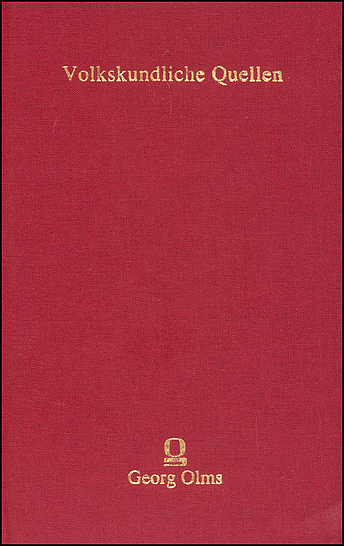Eiselein
Die Sprichwörter und Sinnreden des deutschen Volkes in alter und neuer Zeit
ISBN 978-3-487-15754-2
englischJoseph Josua Eiselein (1791-1856), librarian and professor in Heidelberg, presented his extensive collection "Die Sprichwörter und Sinnreden des deutschen Volkes in alter und neuer Zeit" in 1838. With it, he did an immensely useful and useful pioneering work, which was only possible because of his belesenheit and his considerable philological knowledge. It represents an early scholarly attempt to register proverbs as well as possible with sources and, where necessary, with brief explanations. Everywhere one can see the interest in language and literature that led this restless and probably also ambitious private scholar to deal intensively with the oral and written tradition of the proverbial linguistic heritage. Thus, Eiselein not only recorded proverbs from older collections, but he located evidence in Old, Middle, and Early New High German literature, explored more recent literature, and conducted his own field research. The long introduction is a rich introduction to the study of proverbs, and among the numerous vouchers are previously unrecorded proverbs and proverbial sayings, with source references and sometimes terse explanations. It is thus a collection that continues to be important and, together with Wilhelm Körte's collection "Die Sprichwörter und sprichwörtlichen Redensarten der Deutschen" (1837), published at the same time, and Karl Friedrich Wilhelm Wanders' "Deutsches Sprichwörter-Lexikon," must be considered a basic work.
Joseph Josua Eiselein (1791–1856), Bibliothekar und Professor in Heidelberg, legte 1838 seine umfangreiche Sammlung "Die Sprichwörter und Sinnreden des deutschen Volkes in alter und neuer Zeit" vor. Er hat damit eine ungemein brauchbare und nützliche Pionierarbeit geleistet, die nur durch seine Belesenheit und seine erheblichen philologischen Kenntnisse möglich war. Sie stellt einen frühen wissenschaftlichen Versuch dar, Sprichwörter so gut wie möglich mit Quellen und wo nötig mit kurzen Erklärungen zu registrieren. Überall zeigt sich das Interesse an Sprache und Literatur, das diesen rastlosen und wohl auch ehrgeizigen Privatgelehrten dazu geführt hat, sich intensiv mit der mündlichen und schriftlichen Überlieferung des sprichwörtlichen Sprachguts zu beschäftigen. So hat Eiselein nicht nur Sprichwörter aus älteren Sammlungen aufgenommen, sondern er hat Belege in der alt-, mittel- und frühneuhochdeutschen Literatur aufgefunden, die neuere Literatur durchforscht und seine eigene Feldforschung durchgeführt. Die lange Einleitung ist eine reichhaltige Einführung in die Sprichwörterkunde, und unter den zahlreichen Belegen befinden sich auch vorher nicht registrierte Sprichwörter und sprichwörtliche Redensarten mit Quellenangaben und zuweilen knappen Erklärungen. Es dreht sich also um eine weiterhin bedeutende Sammlung, die zusammen mit Wilhelm Körtes gleichzeitig erschienener Sammlung "Die Sprichwörter und sprichwörtlichen Redensarten der Deutschen" (1837) und Karl Friedrich Wilhelm Wanders "Deutschem Sprichwörter-Lexikon" als Basiswerk zu gelten hat.


